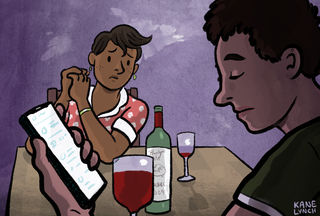Relationships
When One Relationship Partner Is More Interested
The principle of least interest and what it means for your relationship.
Posted October 17, 2019 Reviewed by Davia Sills

Recently I encountered a relationship situation that brought to mind the principle of least interest and what it telegraphs about relationships where one partner is far more interested than the other. It’s an old theory, originating in 1938 with a sociologist named Waller. He noted that when one relationship partner is more emotionally invested in the relationship than the other, the less involved partner has more power in the relationship.
Of course, sometimes a relationship starts with one partner being more interested in the relationship than the other (at the beginning, partners often move at different paces in their emotional involvement with one another). More problematic is that situation where one person is really not all that interested in a romantic relationship with the other (or has lost interest), and deep down knows this is unlikely to change. This person is the least interested (LI), and they have the power to define the relationship on their terms.
The LI sometimes intentionally, sometimes unintentionally, exploits the most interested (MI), who accepts higher relationship costs to keep the LI from walking away. For example, I once knew an MI person who desired a monogamous relationship. As a condition of staying, their LI partner required they accept a polyamorous relationship. Mongeau and his colleagues (2013) found that in many cases, “friends with benefits” relationships often involved an MI partner who accepted the arrangement in the hopes it would become more serious.
The imbalanced MI/LI relationship can last for a while. The LI often doesn’t want to give up the many benefits delivered by the MI. The LI rationalizes by emphasizing that they’ve been honest with the MI, and the MI has chosen to accept the relationship terms. Sometimes the LI is truly ambivalent and doesn’t want to cut the MI loose in case they change their mind.
Because the LI stays, and there are occasional hints of romance, the MI remains hopeful. They give, sacrifice, and compromise themselves. But this is also the MI’s power: Their willingness to take what they can get, when they can get it, and their generosity towards the LI make it harder for the LI to cut them loose.
Waller (1938) argued that in the long run, relationships like these are usually unhealthy. I agree. The MI eventually feels resentful about being taken for granted and taken advantage of and hurt that they have to sacrifice and compromise themselves to keep the LI.
The LI may feel angry or resentful about being manipulated into staying. They may feel guilty about receiving more relationship benefits than the MI, and about how their lessened interest hurts the MI. Sprecher and colleagues (2006) found that partners in these unequal relationships were less satisfied than couples where both partners were equally invested and that MI/LI relationships were more likely to end.
I've been on both sides of this dynamic. If I were to offer some tough advice, it might be: If you’re the LI, and your lack of interest or ambivalence persists, the right thing to do is to end the relationship so that the most interested can recover and move on to find a more satisfactory relationship. Yes, you can rationalize that it’s the MI’s choice to accept the relationship as you define it. But at some level, you probably recognize that perhaps you’re taking advantage of the dynamic because you like the adoration, the “treats,” and having a relationship in your back pocket in case you decide you want it later.
If you’re the MI, you should recognize that your dignity and self-respect are high prices to pay to get the LI to be in a relationship with you; that’s not what healthy relationships are made of. Holding on also keeps you from finding a healthier relationship, where you don't have to compromise yourself.
You might also think about whether it’s unfair of you to make it so hard for the LI to leave and whether you're manipulating them to get them to stay. When it’s increasingly obvious that the odds of the relationship turning into something you want aren’t in your favor, it’s best to cut your losses and move on.
Then, of course, there’s always therapy. If you seem to have a pattern of being the MI in your relationships, you may need to explore why you end up in relationships with reluctant or unavailable partners and are prone to this type of imbalanced relationship.
Facebook image: WAYHOME studio/Shutterstock
References
Mongeau, P. A., Knight, K., Williams, J., Eden, J., & Shaw, C. (2013). Identifying and explicating variation among friends with benefits relationships. Journal of Sex Research, 50, 37-47.
Sprecher, S., Schmeeckle, M., & Felmlee, D. (2006). The principle of least interest: Inequality in emotional involvement in romantic relationships. Journal of Family Issues, 27, 1255-1280.
Waller, W. (1938). The family: A dynamic interpretation. New York: Gordon.




